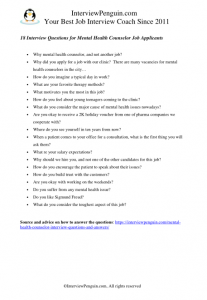Mental health issues are very common nowadays. Is it because people struggle to deal with the difficulties of 21st century, and with all challenges they have to face in their everyday life? Or is it because the pharma and insurance business makes it way too easy (and even favorable for certain individuals working in healthcare), to diagnose a mental health condition?
The future will tell the truth. For now, one thing is certain: Career of a mental health counselor is on a rise, and you won’t struggle with “customers” in your new job, regardless of your place of work.
But how to get this position in an interview? We will have a look at some questions you will face, and also give you bit of advice on the impression you should make, depending on the place of your work.
Table of Contents
Show them that you care, and do your research
This is not only a job–it is also a mission, and often a tough one. You won’t always share the same idea of an optimal treatment with people who run the clinic or psychiatric hospital.
Some prefer prescribing pills–and loads of them. That’s the end of the job, the end of the story, except of occasional electroshock therapy. Well done, well paid, everyone is sleeping in their beds, suppressed by the drugs.
But nobody is actually being cured. Suppressing the symptoms of an illness and curing it are two different things (you probably know this already).
Other places are run in a different way, however:
Group therapy sessions, addressing the underlying causes of most mental illnesses (such as dealing with social and family problems, complexes the patients suffer, the wrong self-image and image of the world, etc), form the daily program in these places.
Do your research. Try to find out as much as you can about their facility, the way they try to help the patients, the forms of treatment they prefer. This will help you immensely in your interview. It will help you to connect with the interviewers, to express the right opinion about certain treatments (one that aligns with their philosophy).
It can actually even help you to decide whether this really is the place where you want to work.
Okay, enough of philosophy. Let’s have a look at the questions you will face.
Why mental health counselor, and not another job?
You can say that you see the potential in this career, or that you are bothered by the growth of mental health issues in young generation.
You can also say that you feel the need to help people, and basically you should show some good intentions (good from your view).
Another option is referring to a mental health issue in your family, and saying that you always wanted to know more, to learn how to help the person you love, and therefor decided to pursue this particular career.
Why did you apply for a job with our clinic? There are many vacancies for mental health counselors in the city…
More often than not you won’t care. You just applied because the place of work is convenient, located near your house, or you have a good traffic connection with the place.
But try to come up with something better in your interview–perhaps they have a good reputation, or you know some people who managed to solve their mental issues on the clinic, or you believe that the environment is ideal for curing patients, etc. Basically you can praise them, say good things, strike their ego….
How do you imagine a typical day in work?
A typical day of a mental health counselor in one clinic can look totally different than a day of another one working somewhere else.
Two things can help you to find the right answer to this questions: The job description, and the understanding of the therapy methods they use.
If possible, go and visit the place before your interview. Perhaps all they do there is prescribing drugs, and administering electroshock therapy. In such a setting, mental health counselor is rather a secondary role.
You’d better avoid interviewing there, but if you are tempted by the salary offer, you can go on and apply.
Anyway, once you know what they do, how they treat patients, you will have a better idea of a typical day in their facility.
What are your favorite therapy methods?
This is a technical question, and your chance to show them that you learned something at school. Remember, you are a counselor, and your role is to counsel people–to listen, to help them open up, to give advice.
You can talk about all kinds of therapy approaches (short term, long term), or you can explain how you blend different but complimentary theories in order to work with your clients in the most effective way. The in-detail answer to this question exceeds the purpose of this article.
Other questions you may face in your mental health counselor interview
- What do you want to accomplish on this position?
- What do you consider your greatest weakness as a counselor?
- What do you consider the major causes of mental health issues nowadays, especially when we speak about people in our hospital/facility/etc?
- What do you consider the toughest aspect of this job?
- What are your salary expectations?
- When a client comes to your office for a consultation, what is the first thing you will ask them?
- How do you feel about receiving a luxury holiday voucher from the sales representative of one of the pharma companies?
- How do you plan to build trust with the clients/patients?
- One of the clients, a 16 year old boy, shares their suicide plans with you. What will you do?
- In your opinion, what are the most common mental and emotional problems children face nowadays?
- How do you imagine your cooperation with psychiatrists and other staff at the clinic? Do you have any expectations on them?
- …………..
Conclusion, answers to all questions
Interview for a job of a mental health counselor belongs to interviews with average difficulty. Most of the time you won’t compete with many other people for the job. Sometimes you will be the only candidate. It makes things easier, but it doesn’t guarantee that they will hire you.
The biggest pitfall lies in the wrong understanding of the philosophy of the particular mental health clinic and their attitude to the patients. This can result in bad interview answers on your side, or, even worse, in a wrong choice of your place of work… Do a good research, and make sure twice that you want to work on that particular place.
Once this is clear, you should just prepare for the questions from our article, and subsequently ace your interview.
If you struggle with your interview answers, have a look at the eBook I wrote for you, the Mental Health Counselor Interview Guide. Multiple brilliant answers to 25 most common interview questions for mental health counselors will help you prepare for every challenge you may face in this interview, impress the interviewers, and walk away with a new employment agreement.
Thank you for checking it out, I wish you good luck in your interview!
Matthew
* You can also download the full list of questions in a one-page long PDF, and practice your interview answers anytime later:
May also interest you:
- Mental health nurse interview questions.
- School counselor interview questions.
- Psychiatry residency interview questions.


